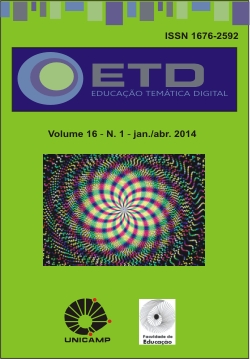Abstract
Distance education (DE) has resulted in significant changes in the Brazilian educational context, especially in higher education, which has been considerably enhanced the openings. The objective of this research is to present the perception of higher education teachers who work in public and private institutions, about the institutionalization and practice of distance education. This is a research interpretive, exploratory. Data collection involved document analysis and in-depth interviews with six teachers in higher education have been intentionally selected, in the states of Santa Catarinaand São Paulo. The results of the narrative analysis showed that the perspective of DE, from the perspective of teachers, is focused on a critical analysis of the educational reality, being that they have followed the movement of the institutions with interest in distance education and demonstrate concerned with the direction the expansion of the modality, especially with regard to precarious of the teaching role at the expense of overvaluation of technology and reduce educational costs. Concerning the vision of the future of DE there are differences in Brazil - apparently, some tend to be optimistic while others tend to be pessimistic. Is understood that the expansion of the distance learning in higher education is an important process for the Brazilian educational reality, as controversial, hence the relevance of this study.References
ABREU-DE-LIMA, Denise Martins de; ALVES, Mario Nunes. O feedback e sua importância no processo de tutoria a distância. Pro-Posições, Campinas, v. 22, n. 2, p.189-205, 2011.
ALMEIDA, Maria Elizabeth Bianconcin. Formando professores para atuar em ambientes virtuais de aprendizagem. In: ALMEIDA, Fernando. (Coord). Projeto Nave. Educação a distância: formação de professores em ambientes virtuais e colaborativos de aprendizagem. São Paulo: [s.n.], 2001.
ALONSO, Kátia Morosov. Educação a distância e tutoria. In: ALONSO, Kátia Morosov; RODRIGUES, Rosângela Sschuars; BARBOSA, Joaquim Gonçalves. (Coord). Educação a distância: práticas, reflexões e cenários plurais. Cuiabá: Central do Texto: EdUFMT, 2009.
BARDIN, Laurence. Análise de conteúdo. São Paulo: Edições 70, 2011.
BELLONI, Maria Luiza. Educação a distância. 5 ed. Campinas: Autores Associados, 2009
BRASIL. Ministério da Educação. Secretaria de Educação a Distância. Referenciais de qualidade para educação superior a distância. Brasília, DF, 2007. Disponível em: http://portal.mec.gov.br/seed/arquivos/pdf/referenciaisead.pdf. Acesso em: 14 abr. 2012.
BRASIL. Decreto 5.800, de 8 de junho de 2006, Dispõe sobre o Sistema Universidade Aberta do Brasil – UAB. Diário Oficial [da] República Federativa do Brasil, Brasília, DF, ano CXLIII, n. 110, seção 1, p. 4, 09 de jun. 2006.
BRASIL. Decreto no 5.622, de 19 de dezembro de 2005. Regulamenta o art. 80 da Lei no 9.394, de 20 de dezembro de 1996, que estabelece as diretrizes e bases da educação nacional. Diário Oficial [da] República Federativa do Brasil, Brasília, DF, 20 de dez. 2005. Disponível em: http://www.in.gov.br/imprensa/visualiza/index.jsp?jornal=1&pagina=1&data=20/12/2005. Acesso em: 14 abr. 2012.
BRASIL. Lei no 9.394, de 20 de dezembro de 1996. Estabelece as Diretrizes e Bases da Educação Nacional. Diário Oficial [da] República Federativa do Brasil, Brasília, DF, 23 de dez. 1996. Seção 1, p. 27833-27841. Disponível em: http://www.in.gov.br/imprensa/visualiza/index.jsp?jornal=1&pagina=1&data=23/12/1996. Acesso em 16 abr. 2012.
COORDENAÇÃO DE APERFEIÇOAMENTO DE PESSOAL DE NÍVEL SUPERIOR (CAPES). Universidade Aberta do Brasil. Novo Portal Capes. Disponível em: http://uab.capes.gov.br. Acesso em 24 ago. 2012.
FRANÇA, Cristineide Leandro; MATTA, Karen Weizemann da Matta; ALVES, Elioenai Dornelles Alves. Psicologia e educação a distância: uma Revisão Bibliográfica. Psicologia, Ciência e Profissão, v. 32, n. 1, p.4-15, 2012.
GIL, Antônio Carlos. Métodos e técnicas de pesquisa social. 6. ed. São Paulo: Atlas, 2008.
GOMES, Luiz Fernando. EaD no Brasil: perspectivas e desafios. Avaliação, Campinas, v. 18, n. 1, p.13-22, 2013.
INSTITUTO NACIONAL DE ESTUDOS E PESQUISAS EDUCACIONAIS ANÍSIO TEIXEIRA (INEP). Censo da educação superior 2010: resumo técnico. Brasília: Instituto Nacional de Estudos e Pesquisas Educacionais Anísio Teixeira, 2012. Disponível em: http://portal.inep.gov.br/web/censo-da-educacao-superior/resumos-tecnicos. Acesso em 24 ago. 2012.
KRAMER, Erica Coester. Educação a distância: da teoria à prática. Porto Alegre: Alternativa, 1999.
MACKAY, Stephen; STOCKPORT, Gary. Blended learning, classroom and e-learning. The business review - Cambridge, v. 5, n. 1, p. 82-88, 2006.
MINISTÉRIO DA EDUCAÇÃO (MEC). Sistema e-MEC. Disponível em: http://emec.mec.gov.br. Acesso em 24 ago. 2012.
MOORE, Michael; KEARSLEY, Greg. Educação a distância: uma visão integrada. São Paulo: Cengage Learning, 2010.
MORGAN, Gareth. Paradigmas, metáforas e resolução de quebra-cabeças na teoria das organizações. In: CALDAS, Miguel; BERTERO, Carlos Osmar (Org.). Teoria das organizações. São Paulo: Atlas, 2007. p. 12-33.
NUNES, Ivônio Barros. Noções de educação a distância. Revista Educação a Distância, Brasília, n. 4/5, dez./abr. 1993-1994.
NISKIER, Arnaldo. A educação na virada do século. Rio de Janeiro: Expressão e Cultura, 2001.
OLIVEIRA, Paulo Cristiano de; NAKAYAMA, Marina Keiko; PILLA, Bianca Smith. Avaliação de sistemas de educação a distância via web: o caso do Senac EaD. In: ENCONTRO DE ADMINISTRAÇÃO DA INFORMAÇÃO – ENADI, 3, 2011, Porto Alegre. Anais... Porto Alegre: ANPAD, 2011.
RIBEIRO, Alexandre; SILVA, João; BOFF, Elisa; VICCARI, Rosa. Dos ambientes de aprendizagem às comunidades de prática. In: SIMPÓSIO BRASILEIRO DE INFORMÁTICA NA EDUCAÇÃO, 22., 2011, Aracaju. Anais... Aracaju: SBIE, 2011.
ROESCH, Sylvia Maria Azevedo. Projetos de estágio do curso de administração. São Paulo: Atlas, 1996.
SCHLÜNZEN JUNIOR, Klaus. Educação a distância no Brasil: caminhos, políticas e perspectivas. ETD – Educação Temática Digital, Campinas, SP, v. 10, n. 2, p.16-36, jun. 2009.
TAYLOR, Steven; BOGDAN, Robert. Introduction to qualitative research methods: a guidebook and resource. 3.ed. New York: John Wiley, 1997.
TRIVIÑOS, Augusto Nibaldo Silva. Introdução à pesquisa em ciências sociais: a pesquisa qualitativa em educação. São Paulo: Atlas, 2011.
VERGARA, Constant Vergara; CALDAS, Miguel Caldas. Paradigma interpretacionista: a busca da superação do objetivismo funcionalista nos anos 1980 e 1990. In: CALDAS, Miguel
Caldas; BERTERO, Carlos Osmar (Org.). Teoria das organizações. São Paulo: Atlas, 2007. p. 223-234.
The ETD - Digital Thematic Education uses the Creative Commons license (CC), thus preserving the integrity of the articles in an open access environment.

